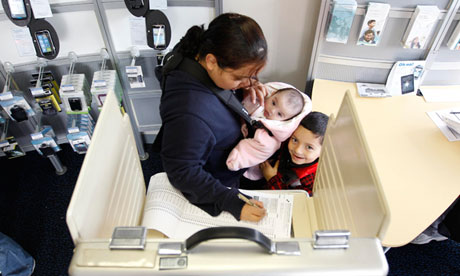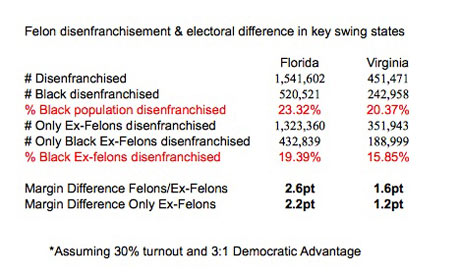Felon voting rights have a bigger impact on elections than voter ID laws
When it comes to minority voting rights in the US, restrictions on felons and ex-felons are the largest issue

A Chicago voter casts her vote with her two children at a polling place in a cellular store during the US presidential election in Chicago, Illinois. Photograph: Jeff Haynes/Reuters
Voter identification laws have Democrats up in arms. One of the reasons, as Nate Cohn illustrated last week, is that they disproportionately affected non-white and Democratic voters in North Carolina. This effect, however, only would have padded Romney's lead in the state by 0.5pt to 0.8pt. In other words, it would only have made a difference in the tightest of elections, and North Carolina isn't close to being the state that determines the winner in presidential elections.
If Democrats want to be upset about something, they should turn their attention to felon and ex-felon voting restrictions. As I investigated last summer, these rules are quite unusual by international standards. Moreover, they have far more potential to actually change election outcomes than voter ID laws.
In a 45-country study by ProCon.org, 21 countries have barely to no restrictions of any type on felon voting. This includes Germany, Israel, and South Africa. Another 15 countries have limited restrictions. This includes Australia, France, and New Zealand. Putting the two groups together means that less than 20% of the countries studied had complete bans of felon voting. Only 11% of the countries had bans post-release. Even Russia wasn't on this list.
Compare this to the United States where most states prohibit felons from voting. The two states that allow it are Maine and Vermont. These two states also happen to be the whitest states in the nation. Another 13 states and the District of Columbia allow felons on parole to vote. Most of these 13 states have incredibly small black populations such as Montana, New Hampshire, and Utah. An additional four states allow those on probation to vote. Nineteen states allow voting once release is final. And the real kicker is that 12 states stop felons from voting permanently if they don't meet certain requirements.
The people overwhelmingly affected by these laws are minorities. Only 2.5%, 5.8 million people, in the voting age population were made ineligible to vote by felon voting laws in 2010, according to the Sentencing Project (pdf). That percentage tripled to 7.7% among African-Americans. Another way of putting this is that 38%, 2.2 million, of all those stopped from voting by felon restrictions are black. About a million black ex-felons (i.e. those who have "paid their debt to society") are disenfranchised.
Not surprisingly, these voters would vote overwhelmingly Democratic. Astudy of felon voting patterns (pdf) from 1972 to 2000 found on average 30% of felons and ex-felons would vote if given the chance, and about three out of four would vote for the Democratic nominee for president. This would have doubled Al Gore's margin in the national vote. Of course, it's the vote tallies at the state level that determine winners in United States elections.
I don't need to tell you that African-American voting rights and the southern United States don't exactly have a glorious history. None of the 21 states where incarcerated felons, those on parole, or on probation can vote are in the south. In Alabama, 15% of voting-age blacks are kept from voting by felon laws, and 14% of voting-age blacks are stopped in Mississippi. This percentage climbs to 19% in Tennessee.
In terms of pure numbers, 137,478 of African-Americans in Alabama, 107,758 in Mississippi, and 145,943 in Tennessee are kept from voting. Of the voters made ineligible by felon voting laws in Tennessee, over 40% are black. That percentage is above 50% in Alabama and Mississippi. The vast majority of these are people who have not only been released prison, but are off probation and parole as well.
The ability to reapply for voting rights can be as simple as submitting an application to the board of elections, but some states make it much more tedious. In Alabama, you can never regain your enfranchisement for certain offenses. In Mississippi, one might lose the right to vote for felony for writing a bad check. Said person would then have to get the state legislature to pass a specific bill allowing them to vote. That's probably too much for someone who likely has a lot of difficulty just finding a job, which is why only 0.28% of ex-felons in Mississippi (pdf) had their voting rights restored in the last decade.
So why hasn't there been more outrage over prisoner and ex-prisoner voting? The reality is that most states are simply uncompetitive in most elections. It wouldn't make a lot of difference.
Florida and Virginia, however, are very competitive* and have very strict felon laws whereby even ex-felons can have difficulty voting. Neither of these states have sterling records when it comes to civil rights overall. In Florida, all ex-felons must wait at least five years before asking an executive board for the right to vote. Some more violent offenders must wait seven years thanks to a rule signed by its Republican governor. Virginia's Republican governor has recently loosened its rules, but all ex-felons must still pay outstanding fines to the courts and some must still wait five years before re-applying.

Over 20% of the black populations in each state are disenfranchised because of felon and ex-felon voting restrictions. That includes about half a million blacks in Florida and a quarter of a million blacks in Virginia. Over 15% of the black populations in each state are disenfranchised because of ex-felon voting restrictions. More than half of the voters made ineligible by Virginia's felon and ex-felon restrictions are black.
In terms of electoral results, President Obama would have added 2.6pt to his 0.9pt Florida margin had felons and ex-felons been allowed to vote. Even if we just count ex-felons, it would have been 2.2pt. Al Gore would have easily won the state given this data. Obama would have tacked on another 1.6pt to his 3.9pt win in the swing state of Virginia if it had the felon voting rules of Maine or Vermont. It would still have been an additional 1.2pt including just ex-felons – as allowed in the vast majority of states.
Thus, laws prohibiting felons and ex-felons have a major impact on elections and may determine a winner in the near future. I don't expect people to take up the banner of felon and ex-felon voting rights. They're not are as sexy as a topic as voter identification for obvious reasons. But if you're looking for voting restrictions that afflict minorities in the south and can have major electoral implications, then felon and ex-felon voting laws have a far greater impact than voter identification laws.
*The competitive state of Iowa has recently switched its rules to tighten ex-felon voting thanks to its Republican governor. Up-to-date data, however, is unavailable on how many people this would affect. John Kerry likely would have won Iowa (pdf) had felons been allowed to vote.
RT: Jenna Çapulcu Pope @BatmanWI
ReplyDelete"It's hard to explain to my children why daddy was arrested for signing in the state Capitol." #wiunion
RT: Jenna Çapulcu Pope @BatmanWI
ReplyDelete"I voted for Scott Walker, and I was arrested by his administration in the rotunda as working media." #wiunion